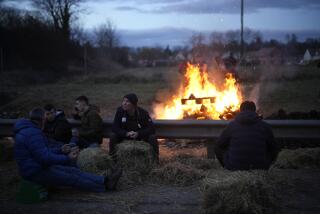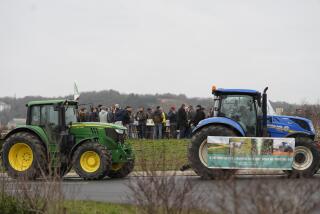EU Seeks to Show Farm-Policy Progress
KILLARNEY, Ireland — European Union ministers opened a debate Sunday on how to convince skeptical trade partners of progress made in reducing trade-distorting farm support, hoping to avoid more demands for concessions in world trade talks.
The EU faces mounting pressure to abolish farm export subsidies but insists that others, especially the United States, do the same. Washington says it is ready to eliminate all farm export subsidies to help the EU agree to the goal.
European unwillingness to eliminate these subsidies by a certain date has been a major obstacle to reaching a deal on agriculture in the stalled World Trade Organization negotiations, which also cover industrial goods and services.
For the EU, a key concern remains that others do not seem to appreciate what has already been achieved, according to a working paper being discussed by the EU’s 25 farm ministers in Killarney, in western Ireland.
“The extent of the reforms of its agriculture policy carried out by the EU since the early 1990s has been remarkable,” said the paper, drafted by Ireland, which currently holds the EU presidency.
“Yet, in the negotiations ... the EU has found itself continually subjected to more and more demands. This suggests a failure to bring home to our WTO partners the significance of the reforms of our domestic support arrangements and the value, or potential value, of the trade concessions that we have made.”
The debate comes just days before trade officials and diplomats representing five core WTO members -- Australia, Brazil, India, the United States and the EU -- are due to meet in Paris to try to kick-start world talks, known as the Doha round.
Their meeting is expected to focus on lowering barriers to agricultural imports, one of the biggest stumbling blocks.
The EU spends some 43 billion euros a year on its farm policy, nearly half of its entire annual budget. By far the largest proportion of this goes to France.
The bloc insists that it has already made massive strides in reducing the worst of its trade-distorting farm support -- market price guarantees and export subsidies -- in two reforms in 1992 and 1999 and also in major changes agreed to last June.
“The fact that the EU is still under pressure in the Doha development round is difficult to understand in the light of the sweeping reforms,” the paper said, adding that greater efforts might be needed to communicate what benefits the farm reforms would bring to international agricultural trade.
“If the EU does not succeed in this, there is a danger that the future of the EU’s agricultural policy will be determined, not by the Council of Ministers, but by external forces, as WTO partners continue to demand further changes from the EU.”
One suggestion, diplomats say, is for EU governments to become “ambassadors” to sell the bloc’s farm reforms to its skeptical trade partners rather than just the European Commission, which negotiates external trade on behalf of the EU.
More to Read
Sign up for Essential California
The most important California stories and recommendations in your inbox every morning.
You may occasionally receive promotional content from the Los Angeles Times.










